no, a const is a const, not a static - it is a special-case, with different rules; it is only set at compile-time (not runtime), and it is handled differently
the crux here is what the following means:
var foo = SomeType.StaticValue;
vs
var bar = SomeType.ConstValue;
in the first case, it reads the value at runtime from SomeType, i.e. via a ldsfld; however, in the second case, that is compiled to the value, i.e. if ConstValue happens to be 123, then the second is identical to:
var bar = 123;
at runtime, the fact that it came from SomeType does not exist, as the value (123) was evaluated by the compiler, and stored. Hence it needs a rebuild to pick up new values.
Changing to static readonly means that the "load the value from SomeType" is preserved.
So the following:
static int Foo()
{
return Test.Foo;
}
static int Bar()
{
return Test.Bar;
}
...
static class Test
{
public static readonly int Foo = 123;
public const int Bar = 456;
}
compiles as:
.method private hidebysig static int32 Bar() cil managed
{
.maxstack 8
L_0000: ldc.i4 0x1c8
L_0005: ret
}
.method private hidebysig static int32 Foo() cil managed
{
.maxstack 8
L_0000: ldsfld int32 ConsoleApplication2.Test::Foo
L_0005: ret
}
Note that in the Bar, the ldc is loading a value directly (0x1c8 == 456), with Test completely gone.
For completeness, the const is implemented with a static field, but - it is a literal field, meaning: evaluated at the compiler, not at runtime.
.field public static literal int32 Bar = int32(0x1c8)
.field public static initonly int32 Foo
